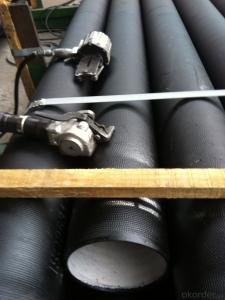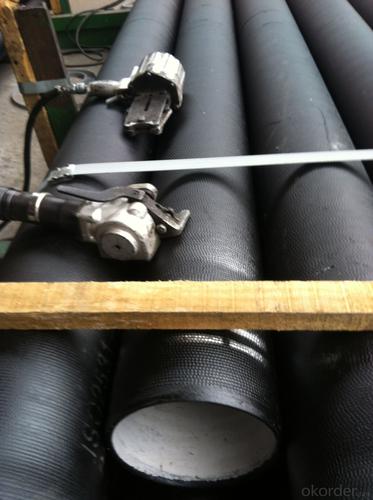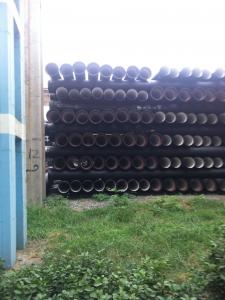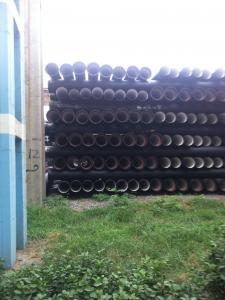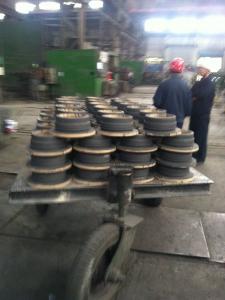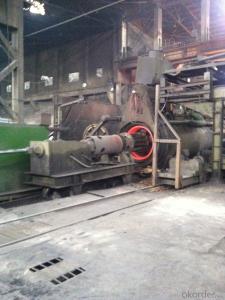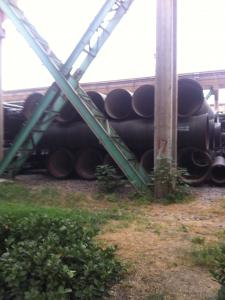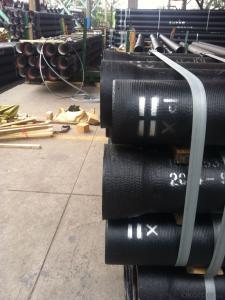DUCTILE IRON PIPES AND PIPE FITTINGS K9 CLASS DN350
- Loading Port:
- Tianjin
- Payment Terms:
- TT OR LC
- Min Order Qty:
- 22 pc
- Supply Capability:
- 3000 pc/month
OKorder Service Pledge
OKorder Financial Service
You Might Also Like
Material : Ductile Cast Iron
Size Range : DN 80mm to DN 2000mm
Unit Effective Length : 6m or 5.7m
Manufacture Standard: ISO 2531:1998/ EN 545:2006/EN 598:2007
Annual capacity : 200,000 tons
Coating Exterior: Zinc 130g/m2 according to ISO 8179-1 and bitumen coating 70 microns.
Cement Interior: Portland Cement/ High Alumina Cement/ Sulphate Resisting Cement Lining according to ISO 4179
Special requirements on external coating and internal lining can be applied
We also provide accessories such as SBR/EPDM rubber gaskets, lubricant paste, pipe caps, PE sleeves, etc.
Additional Parts:
Each pipe is strictly inspected according to related standard to ensure permanently high performance.
Easy Installation at site and service free for life
Long Service Lifespan
Quotation will arrive you within 24hours once we get your inquiry.
We guarantee offering you a competitive price.
A copy of original inspection reports of pipes will be offered after shipment.
Photos of loading process will be sent to the customer after shipment effect.
We will follow-up the delivery progress after shipment effect and update to the customer on weekly basis.
- Q: What is the expected thermal expansion coefficient of ductile iron pipes?
- The thermal expansion coefficient of ductile iron pipes can vary due to several factors, such as the iron's specific composition and the temperature range of pipe usage. However, as a general rule, ductile iron pipes typically have a thermal expansion coefficient ranging from 10 to 14 x 10^-6 per degree Celsius (10-14 μm/m°C). This means that for every increase of one degree Celsius in temperature, the length of a ductile iron pipe will expand by approximately 10 to 14 micrometers per meter. It is important to acknowledge that these values are not exact and may differ depending on the specific circumstances and application of the pipes.
- Q: Can ductile iron pipe be used for potable water systems?
- Potable water systems can utilize ductile iron pipe. Ductile iron, a form of cast iron, stands out for its strength, durability, and ability to handle high pressure. It is also resistant to corrosion, making it suitable for water distribution systems. Due to its long lifespan and minimal upkeep requirements, ductile iron pipe is frequently employed in potable water systems. Various standards organizations, such as the American Water Works Association (AWWA), have approved its use in potable water applications. However, it is crucial to adhere to the correct standards and regulations during the manufacturing and installation of ductile iron pipe for potable water systems to guarantee the safety and quality of the water supply.
- Q: Can ductile iron pipe be used for water treatment plant sludge handling?
- Indeed, water treatment plant sludge handling can utilize ductile iron pipe. Renowned for its robustness and longevity, ductile iron pipe is well-suited for managing diverse fluid types, such as sludge. It possesses the ability to endure the corrosive characteristics of sludge and remains resistant to abrasion, a crucial aspect in any sludge handling system. Moreover, the smooth interior surface of ductile iron pipe aids in preventing obstructions and facilitates the smooth flow of sludge, resulting in enhanced efficiency. In conclusion, ductile iron pipe is an dependable option for water treatment plant sludge handling.
- Q: What are the different lining thickness options for ductile iron pipe?
- The different lining thickness options for ductile iron pipe typically depend on the specific application and the requirements of the project. The most common lining options for ductile iron pipe include cement mortar lining, polyurethane lining, and polyethylene lining. Cement mortar lining is one of the oldest and most widely used lining options for ductile iron pipes. It involves applying a layer of cement mortar to the inner surface of the pipe, which provides protection against corrosion and enhances the hydraulic performance of the pipe. The thickness of cement mortar lining can vary, typically ranging from 3mm to 6mm. Polyurethane lining is another popular choice for ductile iron pipes, especially in applications where resistance to abrasion and chemical attack is required. Polyurethane linings are typically applied using a spray or casting method, and the thickness can vary depending on the specific requirements of the project. Generally, polyurethane linings can range from 1mm to 4mm in thickness. Polyethylene lining is a relatively newer technology for ductile iron pipes and is commonly used in applications where resistance to chemical corrosion is necessary. Polyethylene linings are typically applied using a rotational lining process, where a layer of molten polyethylene is evenly distributed on the internal surface of the pipe. The thickness of polyethylene lining can vary from 2mm to 8mm, depending on the specific project requirements. It is important to note that the lining thickness can be customized based on the specific requirements of the project, such as the corrosiveness of the transported fluid, the operating conditions, and the desired service life of the pipe. Consulting with a qualified engineer or pipe manufacturer is recommended to determine the most suitable lining thickness for a particular application.
- Q: DN1800 can the length of ductile iron pipes be several meters? What is the total weight?
- Ductile cast iron pipe after annealing, the microstructure is ferrite and pearlite, good mechanical properties, excellent corrosion resistance, good ductility, good sealing effect, simple installation, mainly for municipal, industrial and mining enterprises, water supply, gas, oil etc..
- Q: Can ductile iron pipes be used in gravity sewer systems?
- Yes, ductile iron pipes can be used in gravity sewer systems. Ductile iron is a strong and durable material that is commonly used in various applications, including sewer systems. It has excellent resistance to corrosion and can withstand high pressure and heavy loads. Additionally, ductile iron pipes have a smooth interior surface, which helps to reduce friction and improve the flow of waste and wastewater. Therefore, they are a suitable choice for gravity sewer systems, where the flow of sewage relies on gravity to move through the pipes.
- Q: How are ductile iron pipes connected or jointed together?
- Ductile iron pipes are typically connected or jointed together using various methods such as flanged joints, push-on joints, mechanical joints, or restrained joints. These methods ensure a secure and leak-free connection between the pipes, providing a reliable and durable pipeline system.
- Q: Can ductile iron pipes be used for underground water treatment systems?
- Indeed, underground water treatment systems can utilize ductile iron pipes. Renowned for their robustness and longevity, these pipes are well-suited for a range of uses, including underground water treatment systems. They possess exceptional resistance to corrosion, rendering them perfect for transporting water through even the harshest subterranean surroundings. Furthermore, ductile iron pipes boast a remarkable load-bearing capacity, enabling them to withstand the immense pressure and weight exerted by the soil above. Additionally, their versatility allows for simple installation and maintenance, making them a sensible option for underground water treatment systems.
- Q: Usage of ductile iron pipe expander
- Spheroidal graphite iron expander, also known as cast iron telescopic device, is a new type of pipe connector.
- Q: How are ductile iron pipes different from cast iron pipes?
- Ductile iron pipes are different from cast iron pipes in terms of their composition and properties. Ductile iron pipes are made from a type of cast iron that has been treated with magnesium to improve its strength and flexibility. This makes ductile iron pipes more durable, impact-resistant, and less prone to cracking or breaking compared to traditional cast iron pipes. Additionally, ductile iron pipes have a higher tensile strength, allowing them to withstand higher internal and external pressures. In summary, ductile iron pipes are a more modern and advanced version of cast iron pipes, offering improved performance and longevity.
Send your message to us
DUCTILE IRON PIPES AND PIPE FITTINGS K9 CLASS DN350
- Loading Port:
- Tianjin
- Payment Terms:
- TT OR LC
- Min Order Qty:
- 22 pc
- Supply Capability:
- 3000 pc/month
OKorder Service Pledge
OKorder Financial Service
Similar products
Hot products
Hot Searches
Related keywords
